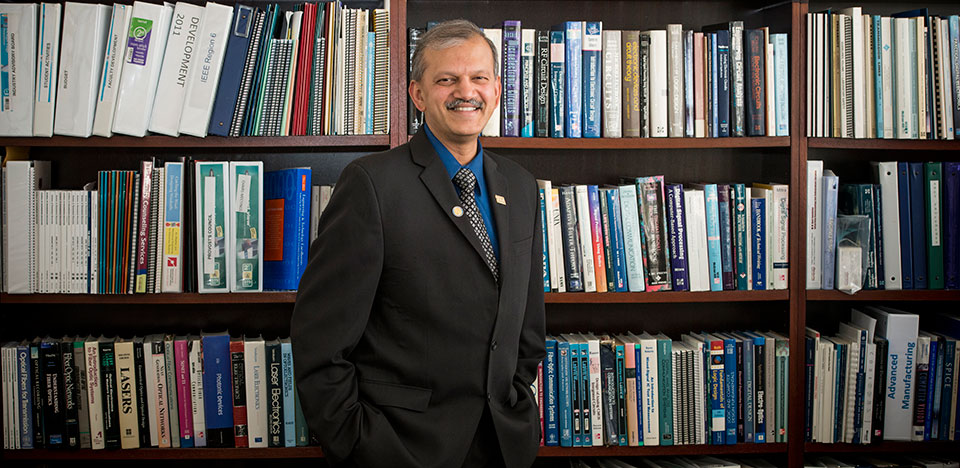Engineering & Computer Science Dean S.K. Ramesh Shines as Bright as His Department

There are countless tales from engineers and computer scientists about burning the midnight oil to find the right configuration of a puzzle only they can see. One degree too hot, and a chemical engineer’s product is unusable; one line of code with the wrong sequence of numbers and letters, and the coder’s end result fails.
It’s tireless work, which is why S.K. Ramesh, dean of California State University, Northridge’s College of Engineering and Computer Science (and professor of electrical and computer engineering) is a leader in the field.
If you send him an email on any given Wednesday, he might not get back to you until the next morning — because he might be halfway around the world attending seminars and spreading the word about the caliber of CSUN’s programs. For the past nine years under his direction, the college has gained worldwide acclaim through agreements with schools such as Kumaraguru College of Technology in India to help foster research collaboration and the exchange of expertise in such areas as assistive technology engineering.
“Assistive technology engineering is at the core of what we do as engineers,” said Ramesh. “We are designing products and processes to help improve and sustain the quality of living for all of us in this world.”
It’s this open access to the wonders of engineering and computer science that makes Ramesh a hit with his staff and students.
“Thanks to his support, new faculty like me can get external funding right after we arrive at CSUN,” said electrical and computer engineering (ECE) professor Ruting Jia. “He is also very supportive to send students and faculty to attend conferences and meet the peers in our fields.”
Jia added that one master’s-level student, Ammar Surti, was awarded third place for a 2015 ASEE-GSW (American Society for Engineering Education-Gulf Southwest) Graduate Research Paper, and Surti made it a point to show his gratitude to Ramesh and the ECE department for their support.
It’s that level of dedication to his position that has made the college a hub of innovation and growth. Since taking over as dean in 2006, Ramesh’s vision for the college has brought in millions of dollars in grant funding. Along with that, the college has grown, adding new programs such as Master’s of Science degrees in Software Engineering, Assistive Technology Engineering and Computer Engineering. These new programs have brought in eight new faculty members.
Ramesh is hands-on in the development of programs to ensure they are more inclusive. Under his watch, the college established an outreach program, ACCESS (Accelerated Coursework in Computer Science and Engineering for Student Success), which enables students from area high schools to enroll in the introduction to engineering course at CSUN.
He also has been a strong ally in the fight to attract and support more underrepresented groups into the STEM (science, technology, engineering, mathematics) fields. After a recent call from the White House to recruit these students for STEM programs, Ramesh and the college focused on efforts to improve student success and graduation across the college’s diverse student population. They teamed with Glendale Community College and College of the Canyons to establish the AIMS2 (Attract, Inspire, Mentor and Support Students) program with the help of a $5.5 million Hispanic Serving Institution STEM grant from the U.S. Department of Education. It features special mentoring and advisement by faculty, tutoring and peer mentoring, along with social activities and opportunities to participate in summer research projects. It has been a great success thus far, even garnering recognition from the White House.
“The AIMS2 program garnered national recognition from Excelencia in Education for its efforts to support and enhance the graduation of underrepresented minorities in engineering and computer science,” Ramesh said. “CSUN was selected to host one of the four White House STEM workshops, thanks in large measure to these successful ongoing programs.”
“I had the pleasure to travel with Dean Ramesh and other faculty members to celebrate the recognition of our AIMS program as a successful example for serving underrepresented minorities in the engineering and computer science fields,” said civil engineering and applied mechanics faculty member Anwar Alroomi. “I still remember Congressman [Tony] Cardenas’ speech at this event, admiring Dean Ramesh’s professional and personal qualities, and how our education systems are in need of such leaders to improve our educational programs.”
Ramesh also has been a strong advocate for building a diverse team of faculty in the college.
“When I joined CSUN in fall 2014, I was one of five female engineering faculty members hired into four departments in [the college],” said mechanical engineering professor Vidya Nandikolla. “From the beginning, Dean Ramesh took time and individually helped all of us to start on good ground. He acted like a mentor, helping and advising, caring and sharing the opportunities. He knew our strengths and showed us the gateways of how to grow in research and also academically.”
Along with accolades from the White House, booming enrollment and worldwide recognition for the program he helped create, Ramesh is being honored by the STEM community. He was named a fellow of the IEEE (Institute of Electrical and Electronics Engineers), one of the most respected associations of technical professionals — and the world’s largest, with more than 400,000 members in chapters around the world, and was recently elected to serve as the 2016 President of IEEE-HKN, the Electrical Engineering Honor Society – which was established in 1904. Even with the recognition, Dean Ramesh would be the first person to tell you that there is work to be done and that it’s all to serve the greater good: the future of STEM.
“It is extremely gratifying to know that your work is valued by your peers,” he said, “and I am very grateful for all the opportunities that the IEEE has provided me to serve our profession.”

 experience
experience